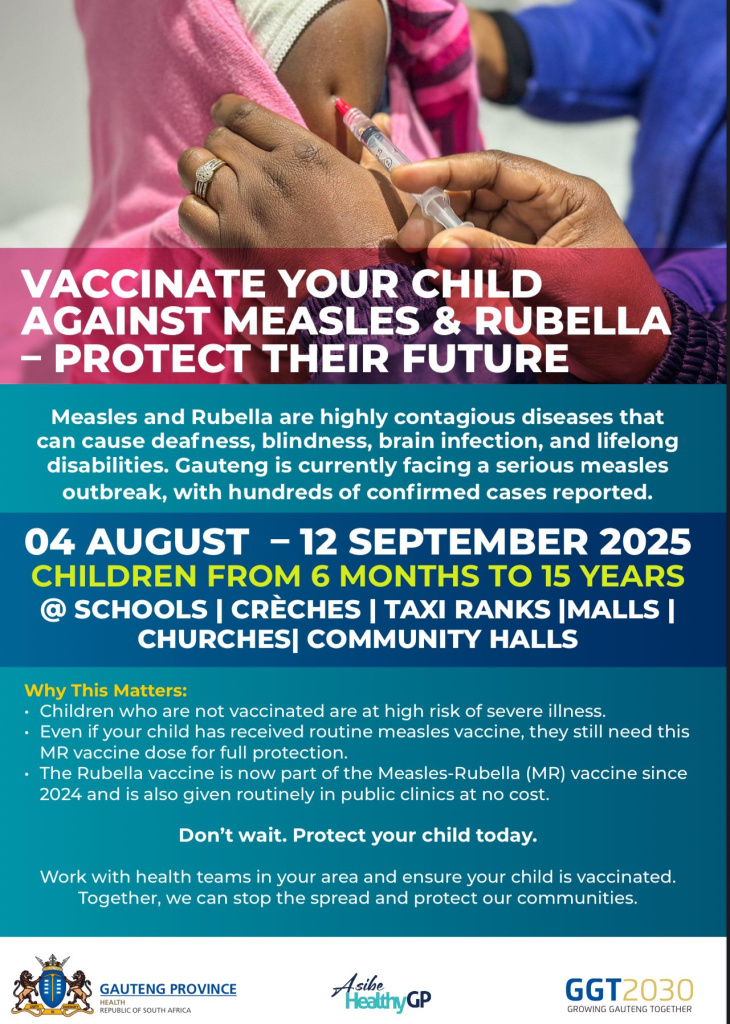What Parents Need to Know About Gauteng’s Measles-Rubella Vaccination Campaign

Gauteng’s ongoing Measles-Rubella (MR) vaccination campaign is a significant public health initiative aimed at protecting children from two dangerous and contagious diseases. As over 4 million children between 6 months and under 15 years become eligible, parents play a vital role in ensuring their children receive this important vaccine. This article explains what parents need to know about the campaign, including its purpose, safety, progress, and how to support their children during vaccination.
ALSO READ: Over 1,200 Gauteng Schools Already Part of Measles-Rubella Vaccination Campaign
Table of contents
- Why Is the Measles-Rubella Vaccine Important?
- Who Is Eligible for Vaccination?
- When and Where Is the Vaccination Campaign Happening?
- What Are the Benefits of the Measles-Rubella Vaccine?
- Is the Vaccine Safe?
- What Should Parents Do to Prepare Their Children?
- What Happens During Vaccination at Schools or Crèches?
- What If Parents Are Hesitant or Have Questions?
- How Can Parents Monitor Their Child After Vaccination?
- How Does This Campaign Support Broader Public Health Goals?
- How Can Parents Stay Updated?
- What Happens After the Campaign?
Why Is the Measles-Rubella Vaccine Important?
Measles and rubella are viral diseases that spread easily, especially among children in close contact such as schools. Measles can cause symptoms ranging from fever, cough, and rash to severe complications like pneumonia and brain inflammation. Rubella is often mild but can cause serious birth defects if a pregnant woman is infected. Vaccinating children not only protects them but also helps prevent outbreaks that can affect entire communities.
Who Is Eligible for Vaccination?
The Gauteng campaign targets children aged from 6 months to under 15 years. This age range includes toddlers, school-age children, and teenagers who may have missed previous vaccinations or require booster doses to strengthen immunity. Vaccination is provided free of charge at participating schools, crèches, and clinics.
When and Where Is the Vaccination Campaign Happening?
The campaign started on 4 August 2025 and will run until 12 September 2025. Vaccination teams visit registered schools and early childhood development centres throughout Gauteng. To date, over 1,266 schools and crèches have been reached, including in Johannesburg, Ekurhuleni, Tshwane, West Rand, and Sedibeng. Parents should check with their child’s school or local clinic to confirm vaccination dates and locations.

What Are the Benefits of the Measles-Rubella Vaccine?
- Protects children from serious illness and complications
- Builds long-lasting immunity to reduce outbreaks
- Helps protect vulnerable groups such as pregnant women and babies
- Reduces school absenteeism caused by vaccine-preventable diseases
By vaccinating children now, parents contribute to healthier families and stronger communities.
Is the Vaccine Safe?
The measles-rubella vaccine used in Gauteng is safe, effective, and approved by health authorities worldwide. Side effects are usually mild and temporary, such as slight fever or soreness at the injection site. Serious reactions are extremely rare. Health workers at schools provide information and answer parents’ questions to ensure they feel confident about the vaccine.
What Should Parents Do to Prepare Their Children?
To help children have a positive vaccination experience:
- Talk calmly about the vaccine and why it’s important
- Bring the child’s immunisation card if available
- Ensure the child has had a light meal before vaccination
- Dress the child in clothing that makes arm access easy for the injection
- Reassure the child during and after vaccination
Good preparation helps reduce anxiety for both children and parents.
What Happens During Vaccination at Schools or Crèches?
Vaccination teams, including trained nurses, visit schools and crèches, offering the vaccine with parental consent. They keep records of those vaccinated and provide guidance on when follow-up doses may be needed. Information leaflets and health talks help build understanding and acceptance among families.
What If Parents Are Hesitant or Have Questions?
It is natural to have questions about vaccines. Parents are encouraged to speak to healthcare professionals, school nurses, or local clinic staff who can provide accurate, evidence-based information. Avoid misinformation by relying on trusted sources such as the Gauteng Department of Health or the World Health Organization.
How Can Parents Monitor Their Child After Vaccination?
Most children have no problems after vaccination. Mild side effects such as slight fever or tenderness can occur but usually pass quickly. Parents should monitor for unusual symptoms such as a high fever or persistent swelling and contact a healthcare provider if concerned.
How Does This Campaign Support Broader Public Health Goals?
The measles-rubella campaign is part of Gauteng’s efforts to eliminate these diseases and improve overall child health. High vaccination coverage helps achieve herd immunity, protecting those who cannot receive vaccines for medical reasons. It also reduces the burden on healthcare facilities by preventing disease outbreaks.
How Can Parents Stay Updated?
Parents can stay informed through their child’s school communications, local clinics, Gauteng Department of Health announcements, and reliable media sources. Engaging with community health talks and school meetings provides opportunities to ask questions and learn more.
What Happens After the Campaign?
Children vaccinated during the campaign should continue their routine immunisations as scheduled by healthcare providers. The campaign complements but does not replace regular vaccinations necessary for lasting protection.




